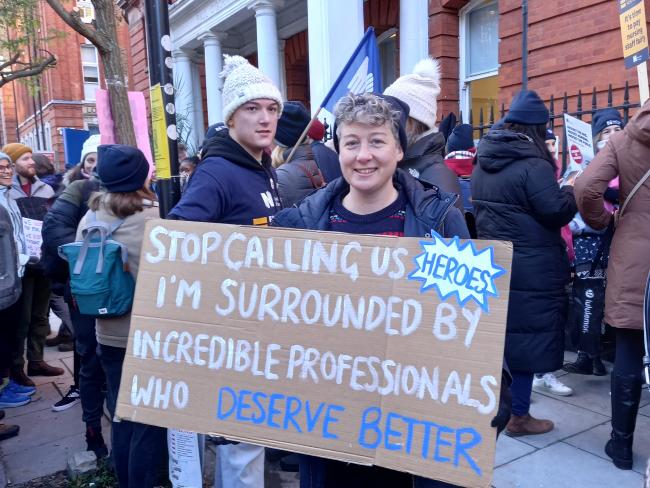17 December 2022

London, 15 December. Nurses from Great Ormond Street Hospital, London, on the picket line. Photo Workers.
On 15 December nurses conducted the first ever national strike in the 106-year history of the Royal College of Nursing (RCN). The next planned strike will go ahead on Tuesday 20 December. The government is so far unmoved and avoids meaningful negotiations.
RCN members formed well organised picket lines across England, Wales and Northern Ireland. Rather like a well-run ward, there was a picket line supervisor in a dark coloured tabard and other picket line members in their white tabards.
Each line had an attendant demonstration of support of up to 100 RCN members including those who had come in from maternity leave. These were very youthful picket lines.
Opposition
The government does not hide its opposition to the nurses’ action. Before the strike Conservative Party chairman Nadhim Zahawi said their action was “exactly what Putin wants to see” – a statement met with widespread ridicule. Then they were briefing that the strike will cost lives, as if all was otherwise well with our health service.
The government sticks to the mantra of “we have followed the recommendation of the pay review body.” But as the Institute for Government points out, “‘The government is not bound by the review bodies’ recommendation. The prime minister and relevant secretaries of state decide how to react to the advice provided.”
Fig leaf
At the end of the first day of action RCN general secretary Pat Cullen described it as a significant turning point for nurses saying, “Ministers find themselves under fresh pressure from unexpected places – their own MPs, NHS leaders and a former chair of the Pay Review Body. Each of these groups, for different reasons, wants the government to stop hiding behind its current fig leaf.”
One of those MPs was Steve Brine, newly elected chair of the parliamentary Health and Social Care Select Committee. He suggested that thinking again would be the “sensible” response.
One of the NHS leaders was Ruth May, Chief Nursing Officer for England, who went to support the picket line at St Thomas’ Hospital in London. Naturally the government tried to distance itself by saying that she did not represent them.
Public warmth
Cullen also noted that on a bitterly cold day, the public warmth towards nursing staff was immense. She said, “For my members, this has been about professional pride, not personal hardship – speaking up for nursing, patients and the future of the NHS.”
‘Nurses will have to work hard to maintain pressure.’
This will not be an easy battle for nurses. They will have to work hard to maintain that steady pressure. They have to regularly remind the public that governments have overridden pay review recommendations in the past; it is within their power to do so. And in any case, the Sunak government has changed its position on several issues already.
The government has turned its back on nurses, and it’s not as they try to make out, nurses turning their back on patients.
Nurses will have to bring home to the public and politicians that they are the frontline, so it’s no good ministers saying they are limiting pay increases “to protect the frontline”. Another fig leaf!
Experience
Listening to nurses’ voices from the picket line it was evident from this first day of action that they have a unique ability and experience to “say it how it is” about our health service and that directness is the best defence for their profession and for patients.
Pat Cullen said that the action will continue until the government participates in meaningful pay negotiations with us over pay.
“…our nursing profession can’t take any more”
She summarised the rationale for taking action, “…once again [on 20 December], we will strike for fair pay and for patient safety. The NHS is in crisis and our nursing profession can’t take any more. The public deserve to know that when they need nursing, there will be enough of us in the right place, with the right skills to deliver the care they need. And right now, we can safely but regrettably say that isn’t the case.”
